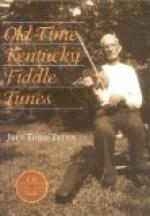“Yes; the man as murdered my father. I’ve had word of him, at last. I’ve heard as how he war seen, years ago, in New Orleans—he war a nigger-trader, then—an’ that he’s come up in th’ bluegrass country, since, like enough under another name.” He looked at Holton eagerly. “I say, sir, you don’t know a man like that, do you?”
Holton spoke a little hurriedly. “No, no; there ain’t no man like that in these parts.”
“It don’t make no differ whar he bides,” said Joe. “Soon or late our paths’ll cross an’ bring us face to face. When he struck down my father it war sealed and signed above that he war to fall by my hand; an’ there’s a feelin’ in my heart that that hour air drawin’ nigh.” He nodded and then turned away. “Good-night, stranger.”
Holton was thoroughly alarmed. Many things distressed him. He could plainly see that his daughter’s love-affair with Layson had gone wrong, he realized that there was little chance that he could buy Madge Brierly’s coal lands at anything but a fair value, and now—to fall by his hand!
“I’ll make that false,” he muttered, “Why, I’ve got to do it!”
He moved away among the trees, but stopped in frequent thought as he progressed.
“They’ll lay the crime on Lorey,” he reflected, after he had laid his plan. “They’ll hunt him down and lynch him and I shall be safe. Layson’ll be ruined, he’ll have to sell Woodlawn, and my gal’ll be th’ missus there, in spite of him. I’ve got to do it.”
Like a shadow of the night he hurried through the grounds until he reached the stable where Queen Bess was thought to be secure.
“Every window barred, every door is sealed but this!” he cunningly reflected as he paused at the front entrance.
With frantic haste, lest he should be discovered at the work, he piled brush from a near refuse pile against the door and stuffed wisps of grass and hay into the bottom of the heap. Into this tinder pile he thrust a lighted match and disappeared, just as Madge came to the bench where she had paused when she first came to Woodlawn, early in the afternoon.
It was plain enough, from her dejected looks and listless attitude, that the dance had given her no pleasure, but, on the contrary, had filled her with distress.
“I couldn’t stand it thar, no longer,” she was thinking, bitterly. “I war jest a curiosity, like a wild woman. Miss Barbarous poked fun at me till I war plumb afraid I’d fly at her like a wild-cat, so I jest slipped away. Oh, I see, now, as I never seed afore; the differ that there is ‘twixt Mr. Frank an’ me! An’ I know, now, what ‘t is air ailin’ me. I loves him. Oh, I loves him better nor my life! But it can’t never be.” She dropped her head into her hands and sobbed. “Good-bye, good, kind, Mr. Frank, good-bye!” She stretched her arms out toward the mansion she had lately left, where lights were twinkling gaily, whence sounds of music now came faintly to her ears. “You’ll soon forget the little mounting girl. You’ll never know she loved you. I’m goin’ back—back to the old mountings.”




